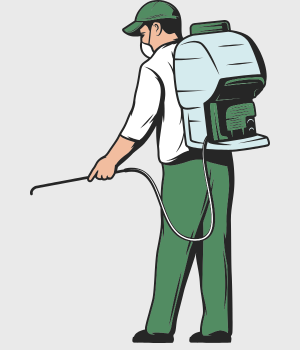Common Bed Bug Causes: Where Do Bed Bugs Come From?

Bed bugs infestations can cause a lot of frustration and pain for homeowners and hotel guests. These tiny insects leave small itching bites that make you feel “dirty”. However, it is a common misconception that bed bugs are drawn to filth: they can live in any environment. So what are common bed bug causes and how to prevent them from infesting your home?
Table of contents
Understanding Bed Bugs
Bed bugs are tiny, reddish-brown insects that feed on the blood of humans and animals. Despite their size, they can cause a lot of discomfort, including itchy bites and psychological distress. Bed bugs are difficult to detect as they hide in cracks, crevices, and bedding during the day, and can be a significant problem for homeowners.
These pests go through several stages in their lifecycle, from eggs to nymphs to adults. Each stage requires a blood meal to grow and develop to the next, which is why bed bugs are so persistent in homes. This feeding behavior, combined with their ability to survive for extended periods without food, makes bed bugs a persistent problem in infested areas.
Origins of Bed Bugs
Bed bugs have a long history and have been present in households for centuries. They were common in ancient civilizations but saw a significant decline in the mid-20th century, with the introduction and use of pesticides. However, in recent decades, bed bugs have made a resurgence. This resurgence is largely due to increased global travel, the use of second-hand furniture, and the development of pesticide resistance.
Bed bugs are excellent hitchhikers. They can spread from one location to another through luggage, clothing, and other personal items, allowing them to travel long distances without detection. This is why international travel is a significant contributor to the spread of bed bugs these days.
Want to find out more about bed bugs treatment in Singapore?

What Causes Bed Bug Infestations?
Bed bugs tend to live where lots of people live or come and go frequently. They can survive up to a year without any food, and they can easily attach themselves to people’s stuff until they find a nice place to live in. Knowing the common causes of bed bug infestations can help you prevent them from occupying your property.
Here are some of the most common causes of bed bug infestations:
- Frequent Travel: Traveling, especially to areas with known bed bug problems, increases the risk of bringing them home. Bed bugs can easily travel on your luggage, clothing, or other personal items. If you stay in a hotel, hostel, or other accommodation with bed bugs, they can easily make their way back home with you.
- Secondhand Items: Bed bugs can also be found in used furniture, clothing, and other secondhand items. That’s why it is important to inspect those items before bringing them home.
- Public Places: Bed bugs can also be picked up in public places like movie theaters, where the warmth of the crowded seating can attract them. They may then be brought home on clothing or personal items.
- Poor Sanitation: While bed bugs can thrive in any (even the cleanest) environments, cluttered or dirty spaces can make it easier for them to hide and reproduce.
- Crowded Living Conditions: Bed bugs thrive in crowded living conditions, such as apartment buildings, dormitories, and shelters.
- Lack of Awareness: Many people are not aware of the signs of bed bugs, which is key to preventing bed bug infestations from becoming a serious problem.

Where Do Bed Bugs Come From?
Despite their name, bed bugs can come from a variety of sources and places. Here are some of the most common places where bed bugs come from:
- Hotels, hostels and other accommodations
- Secondhand furniture, clothing and other items
- Public places, such as movie theaters, public transportation and waiting rooms
- Apartments, dormitories, and shelters
- Office buildings
- Schools, colleges and universities
They can attach themselves to different objects, like:
- Sheets and blankets
- Suitcases or luggage
- Various clutter, like piles of clothing
- Walls, floors, and other openings
- Seams of upholstered furniture
- Cardboard boxes, etc
How Bed Bugs Enter Homes
Bed bugs can enter homes in several ways, including:
- Luggage and personal belongings after traveling. Hotels and other temporary accommodations are common shelters for bed bugs. When travelers unknowingly bring bed bugs home in their belongings, the pests quickly find new hiding spots in bedrooms and living areas.
- Clothing can also serve as a transportation method, as bed bugs can cling to fabrics in public places and be brought into the home unknowingly.
- Used or second-hand furniture, particularly mattresses, couches, and upholstered items. If the furniture has been in an infested area, it may contain bed bugs or their eggs. Once inside, bed bugs can spread throughout a home, especially in multi-unit buildings like apartments or hotels, where they can move between units through cracks in walls or shared spaces.
- Visitors to homes can unintentionally bring bed bugs with them, especially if they have been in contact with infested areas.

How To Avoid Bringing Bed Bugs Into My Home?
Knowing how bed bugs can get into your home is essential to take proactive measures to prevent them from entering your home. They can easily find their way into your home through a variety of sources, so here are some tips to avoid that:
- If you spend the night in a hotel or resort, or even visiting your friend’s house, you can bring the bed bugs home. To avoid this, keep your belongings off the floors. Also, check bedding and furniture in a room where you’re staying.
- They can also hitch a ride on public transportation or from work, making it important to keep an eye out for bed bug bites or any signs of bed bugs.
- Another common way bed bugs can enter your home is through guests staying with you, who could bring them along unknowingly. To prevent this, it’s always a good idea to wash their bedding at the hottest temperature once they leave.
- If you take or purchase used furniture (not only beds), it is also important to inspect those items for black streaks, shed insect casings, and bloodstains.
- Clear your home of clutter where bed bugs can thrive.
What Are Some Signs of a Bed Bug Infestation?
Recognizing the signs of a bed bug infestation early on can help you take prompt action to address the issue effectively. If you notice signs like unexplained bites or blood stains, see our guide on identifying bed bug infestations.
Pro Tip: If you discover bed bugs in your home, contact Killem Pest to get necessary help before it becomes a bigger problem.
Tips for Preventing Bed Bug Infestations
Preventing bed bug infestations requires vigilance and proactive measures. Here are some tips:
- Inspect hotel rooms when traveling
- Inspect luggage
- Regularly inspect your living space for signs of bed bugs
- Check furniture
- Maintain a clean clutter-free environment
- Seek professional help
For comprehensive bed bug prevention strategies, see our complete prevention guide.

Pest Problem? Let Us Help.
We offer fast and effective precision treatments to eliminate pests while ensuring a safe environment for your home or business.
Stay Informed and Act Proactively
Understanding the origins and behaviors of bed bugs is crucial for preventing infestations. By being aware of how bed bugs spread and taking proactive steps to avoid bringing them into your home, you can protect yourself from the stress and discomfort of a bed bug infestation. If you suspect that you have bed bugs, it is essential to act quickly and seek professional help to address the problem before it becomes severe.
Author: Soleha Nisaa
Frequently Asked Questions
Bed bugs are attracted to several factors in homes, including warmth, carbon dioxide exhaled by humans and animals, body heat and human odors such as sweat and body oils, and dark and tight spaces to hide (e.g. cluttered areas and crevices).
No, bed bugs are not caused by poor hygiene. They are attracted to warmth and carbon dioxide that humans emit when they sleep.
Bed bugs primarily feed on the blood of humans and animals, so they do not consume food in the traditional sense.
Bed bugs are attracted to human and animal hosts by scents such as carbon dioxide, body odor, and lactic acid. They are also attracted to the smell of dirty laundry or dirty bedding, so it is important to do your laundry on a regular basis.
Bed bugs do not feed on or show interest in scents associated with regular food items like crumbs, leftovers, or sweet-smelling substances. Additionally, bed bugs are not attracted to light, as they prefer to be active during the darkness of night.
Bed bugs start infestations by being introduced into a new environment, typically through luggage, clothing, or furniture.
Do not panic or immediately start moving furniture, as this can spread the infestation. Avoid using over-the-counter pesticides, as they can be ineffective and dangerous.
Even if you haven’t traveled recently, bed bugs can be brought in by visitors, used furniture, or they can migrate from a neighboring unit in an apartment building.
Yes, bed bugs can live in pillows, though they are more commonly found in mattress seams and bed frames.
No, bed bugs do not live in hair. They prefer to hide in cracks and crevices close to where people sleep.
If left untreated, a bed bug infestation can worsen, leading to severe discomfort and spreading to other areas of the home.






